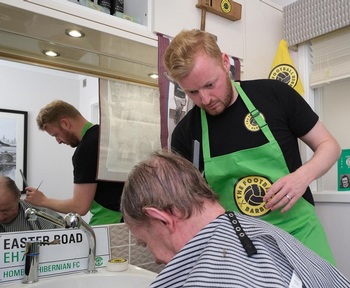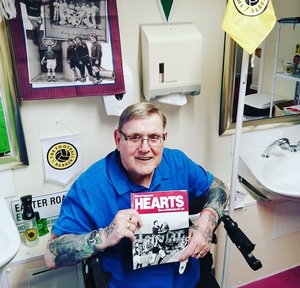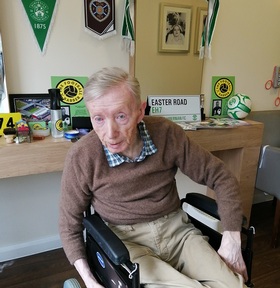Care homes' football barber enables dementia residents to reminisce over 'fitbaw'
When football barber Martin Murphy visits care homes in Edinburgh, he transforms their hair salons into a barber's pop up shop, festooned with football scarves and old programmes, where male residents can reminisce about 'fitbaw'.

His services can be a lifeline for men in Scottish care homes as they tend to be in the minority, and can end up feeling isolated.
‘There’s profound memories when it comes to football’
Martin's twitter profile says: “I am the 'Dementia Friendly Football Barber'! I provide haircuts to gents in care homes, while reminiscing about fitbaw in the 'good auld days”.
Martin came up with the idea of being a care home barber, after realising "that in Scotland there were only three barbers that operate in care homes in the country".
He says: “Pretty much every care home has a hairdresser but as far as a male-specific service is required, I knew if I did it right, providing something different, I felt that I could deliver something that was going to be really positive.”
The concept of the Football Barber was trialled first to see if men in care homes were keen on the concept. Martin says: “We developed a ‘meet and greet’ to meet the gentlemen and their families and things progressed from there.
"Posters were put in the care homes where there were schemes to ask the gentlemen about the idea of a football barber and if they wanted it.”
It started around the same time as the ‘half-time club’ that Martin now runs on a voluntary basis in care homes to help men who might be feeling social isolation and/ or who have dementia.
Football memories act as social cement for many of the men at the care homes, Martin visits.
Pie and Bovril are the main staples of Scottish football and normally enjoyed at half-time. Martin says: “We eventually came up with the idea for a thing called the half-time club. I started a wee thing where the guys are basically almost back at half-time – with a pie and Bovril.”
The barber is a self-confessed ‘football anorak’ and started the club as he felt men in care homes could benefit from the memories football brings.
 He says: “There’s profound memories when it comes to football, and sport in general, and I’m quite conscious of that so I thought ‘I wonder if I could take them back to a time almost as if they’re re-enacting a time, standing on the concourse, having a natter'."
He says: “There’s profound memories when it comes to football, and sport in general, and I’m quite conscious of that so I thought ‘I wonder if I could take them back to a time almost as if they’re re-enacting a time, standing on the concourse, having a natter'."
Disillusion with support work role leads to something new
Martin is no stranger to the care sector as he was a support worker for many years. He supported various clients over an eight-year period – including those with mental health issues, learning disabilities and autism, but he says the organisation he worked for “was poor”.
He says: “There were a lot of issues, a lot of cutbacks and a lot of staff leaving. There was a lot of straying from the rules and I was always pushing for the services to be better – especially trying to improve things for the guys but there were certain limitations and I realised that I come to the end of the line working for that organisation, but I still wanted something to do within social care, but also wanted to do something a bit different.”
Hairdressing salons are turned into barbers ‘pop-up shops’
Being the Football Barber, Martin’s first port of call at a care home is usually the hairdressing salon, which he transforms for the day.
He says: “In care homes, when it comes to salon services, guys only have a generic service where a lady comes and cuts their hair, there isn’t much interaction and then the guy can go back to his room.

“So, when I go to the salon, I literally transform it - the day I’m in I will put up football memorabilia, pictures I put up, pendants, posters, and it transforms the space and literally turns it into a ‘pop-up’ barbershop.
In the ‘barbershop’ Martin uses memory boxes containing tangible things such as old rattles, football strips and programmes.
Some of the memorabilia has been donated by clubs but the majority he has purchased himself.
Martin says: “Hibs and Hearts both wanted to support in a small way and have donated things such as programmes. The vast majority of things are bought independently from the shops of the clubs”.
Football songs are also played to help bring the atmosphere of the game into proceedings. Despite the passion in Scotland for various clubs, and the reported rivalries between the teams, Martin says that he rarely sees instances of tribalism from the residents.
He says: “I was quite struck, there’s only genuinely been two or three instances. It doesn’t really come up as an issue. I don’t know if this is a generational thing because of their age or if because there was a bit more respect in the game a few decades back, but certainly the guys I deal with aren’t interested in all that.”
Latest Features News
 25-Nov-19
2019 Election: Boris Johnson leaves social care in 'too difficult box' but Labour vows to end 'crisis'
25-Nov-19
2019 Election: Boris Johnson leaves social care in 'too difficult box' but Labour vows to end 'crisis'
 18-Oct-19
Podcast: Wendy Mitchell and dementia: 'My biggest fear is not knowing who my daughters are'
18-Oct-19
Podcast: Wendy Mitchell and dementia: 'My biggest fear is not knowing who my daughters are'
 27-Sep-19
Exclusive: Care minister backs care workers' call for time off to grieve and attend funerals
27-Sep-19
Exclusive: Care minister backs care workers' call for time off to grieve and attend funerals
 19-Sep-19
Podcast: Gyles Brandreth says poetry helps ward off dementia
19-Sep-19
Podcast: Gyles Brandreth says poetry helps ward off dementia
 30-Aug-19
Edinburgh Fringe funnyman joins comics facing toughest audience at care home gig
30-Aug-19
Edinburgh Fringe funnyman joins comics facing toughest audience at care home gig